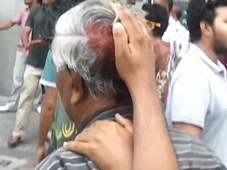When a traffic policeman raises his hand, encased in neat white gloves, all traffic automatically comes to a halt.
Obedience is ingrained in us. We barely stop to think why. Had it been otherwise we would no doubt be in the middle of a perpetual traffic jam.
When a policeman raises his hand, it is not a simple gesture of someone lifting his hand. Behind the gesture lies the authority of the people, a functioning system, an elected government and the goodwill of the masses. The combined moral authority of the people are reflected in that simple gesture.
Today, life is no longer simple anymore. Until February 7, 2012, the Maldivian people lived with the assurance that their interests were represented by a government elected by the majority; that the people’s will was reflected in the way they were governed. Everything turned topsy-turvy on February 7, when President Nasheed resigned office and his Vice President Dr Mohamed Waheed Hassan Manik assumed the mantle of government.
The transition of power would not have caused ripples or raised eye-brows unless the very next day President Nasheed claimed that he had resigned under duress. His resignation had been forced.
In the light of President Nasheed’s statement and after a clear look at the events leading to his ‘resignation’, it wasn’t difficult to believe that indeed Nasheed’s resignation was coerced. What followed afterwards – the appointment of Nazim as the Defense Minister and Abdulla Riyaz as the Police Commissioner – removed any reservations to the contrary.
The security forces – comprising of the Maldives Police Service and the Maldives National Defense Force (MNDF) were instrumental in forcing the President’s resignation. All the circumstantial evidence combined with the data compiled by the media further confirmed Nasheed’s allegations.
All doubts were removed when former police sergeant and Acting Deputy Leader of the PPM, Umar Naseer – known to friends and foes alike as a weapon of mass destruction – blatantly confirmed his active involvement in the overthrow of Nasheed’s government on national TV – “spilling the beans”, as CNN aptly defined it.
During his three years in office President Nasheed worked hard to deliver on his election pledges. He was a symbol of hope for the downtrodden masses whose cause he championed. For 30 years the Maldivian people had lived a hand-to-mouth existence, brutally repressed by the dictator Gayoom. According to the UN 42 percent of the people lived below the poverty line.
Given the role played by the security forces in ousting a vastly popular government, the police and the military have become villains overnight. When the policeman lifts his white-gloved hand he is no longer able to covey the moral authority to instill obedience amongst the masses.
Up until February 7, the military were looked up to by the people for their professionalism and generally enjoyed the respect of the population. Even the youth who sought a career in the armed services were proud to be a part of this elite corps. The military, as a rule, upheld high ethical standards.
Except for a few among the military high command and the police services, the security forces were uninvolved in the intrigue that brought down Nasheed’s government. There was little doubt that the top brass were bought; they had sold not only their souls but had betrayed the confidence and trust of their subordinates, the rank and file of the armed forces.
Those youth, who had pledged their lives to uphold the tenets of Islam and defend the country were being labeled ‘turncoats’, a title they did not deserve as they were as much in the dark as everyone else. The greed of a few commanders who defiled the military’s code of honor had put the stamp of betrayal on the entire armed forces.
The coup has had certain unforeseen influences on the public psyche too. The MDP, led by the ousted President Nasheed doubled in membership overnight. Quite suddenly, public involvement grew by leaps and bounds.
Consequently, civil disobedience has taken root in the public psyche. The security forces are openly scoffed at by the public – the label ‘rebel’, ‘turncoat’, now precedes any description of the police and the military.
Maldivians, as a rule, are apt to shy away from violence. Even under the present trying circumstances violence has yet to be a part of the equation. Even though there have been isolated incidents of violent behavior both on the part of the police and the public, violence is frowned upon by all parties concerned.
There is a very clear demarcation line between civil disobedience and civil war. Unlike Syria, Egypt or other Muslim States where the freedom movement has escalated into unbridled violence and civil war, the Maldives is unlikely to go the same route.
Even if the worst case scenario is considered – let’s say Waheed’s regime refuses to set an early election date – with the security forces unable to contain a public uprising and the use of force becomes mandatory, the decision is likely to result in the fall of the government.
A limited population ensures a close-knit society. Members of the security forces and the general public are bound by close family ties making it virtually impossible for any member of the security forces to implement a ‘shoot order’ even if President Waheed were dumb enough or desperate enough to issue such an order.
Any member of the security forces taking aim on a member of the public will in all probability find his colleague’s gun aimed at his own head. Who else but a madman will aim at a crowd, when the likelihood of shooting a brother, sister, cousin or a close relative is almost a dead certainty?
Civil disobedience, led by the MDP, is here to stay. The protests are gaining ground day by day; each day resulting in the increase in members on the streets. The cycle has taken on a natural life of its own and the pace is being set by the members arrested on a daily basis.
It is only a matter of time before push comes to shove. Waheed’s regime, tottering on the brink, is clearly headed up the creek without a paddle. For Waheed, there is but a single option. Like Humpty Dumpty, he can only fall.
All comment pieces are the sole view of the author and do not reflect the editorial policy of Minivan News. If you would like to write an opinion piece, please send proposals to [email protected]
Likes (0)Dislikes
(0)Dislikes (0)
(0) 
